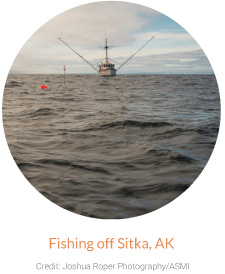The Issue
Climate change is affecting every point on Earth, including our planet’s vast oceans and waterways. Warming water temperatures, ocean acidification, intensified storms, rising sea levels, salinity alterations, and slowing ocean currents are some of the climate change impacts occurring off shores around the globe. Changing ocean conditions greatly affect ocean habitats and the wildlife that depend on them, including the fish that support our valuable wild-caught fisheries. As ocean wildlife continues to adapt to ever changing and often unpredictable conditions, management of marine resources, particularly our fisheries, must also evolve to ensure oceans ecosystems remain balanced and productive for the benefit of all who depend on ocean resources now and in the future.
Climate change has already affected U.S. ocean fisheries in significant ways. Warming waters are causing some fish populations to shift poleward to find more tolerable temperatures, and, in turn, the abundance of many stocks is rapidly shifting from species’ historical ranges to new regions. Natural disasters, such as hurricanes, ocean heat waves, and disease outbreaks, occur more frequently and with greater intensity, and in turn, affect the historical balance of ecosystems, creating a cascading effect of consequences in natural systems. Fisheries managers must consider such uncontrollable events when adopting management measures, such as setting annual catch limits and establishing seasons’ lengths, and move quickly with emergency actions that make in-season adjustments to existing measures in response to unpredicted environmental events. We must also develop mechanisms that will provide coastal communities and fisheries-dependent businesses the means to better predict economic losses attributable to climate-related environmental changes and acute and unanticipated environmental events. Adapting fisheries management to climate change is no longer optional; it is inevitable. We need a proactive approach that can quickly adapt to the reality of our changing oceans and fisheries.
First written in 1976, the Magnuson-Stevens Fishery Management and Conservation Act does not contain specific legislative language to account for or address climate change in fisheries management. Updating the law to include criteria for incorporating climate change data into scientific assessments, and a methodology for doing so, will create a more complete picture of the environmental conditions affecting ocean fisheries. The Magnuson-Stevens Act should be amended to provide guidance to the Secretary of Commerce, NOAA, and the eight regional fishery management councils for adapting conservation and management measures to unpredictable and evolving ocean conditions and ensuring fisheries management decisions support the health and abundance of fish stocks. The law should also provide a mechanism that allows fishery managers to quickly implement regulations or interim measures to prevent overfishing and increase the resiliency of fish stocks in the face of environmental emergencies, including those attributed to climate change. Such improvements to the Magnuson-Stevens Act would help guide fishery managers through the process of accounting for and addressing the wide range of climate change impacts to make the best management decisions for the long-term health and productivity of U.S. fisheries.
The Network’s Position
The Network believes in science-based management of U.S. federal fisheries, including incorporating the best available climate science in stock assessments. The Magnuson-Stevens Act should mandate that federal fisheries managers consider the impacts of climate change in the creation of all fishery management plans, as well as include conservation measures to mitigate those impacts. The law should also recognize the growing reality of climate change emergencies and establish new policies and processes for quickly implementing contingency plans to ensure the health and resiliency of fish stocks in the face of these uncontrollable events.
Recommendations and Actions for Reauthorization
The Network recommends that:
- Fishery management plan requirements should be amended to include a determination of the impacts of climate change on the fishery and establish conservation and management measures to respond to those impacts. Fishery management plans should establish criteria for determining when an emergency attributable to climate change is affecting the fishery or fishing community, such as rapid declines in fish populations, sudden changes in fish distribution, or changes in environmental conditions that could affect fish stocks or fish habitat.
- The Secretary of Commerce should be given the authority to enact emergency regulations or interim measures during a fishing season or fishery management cycle to prevent or reduce overfishing and promote resilience of fish stocks during climate change emergencies. Under such a framework, relevant regional fishery management councils would be consulted prior to setting regulations or interim measures; any measures taken should not exceed the annual catch limit for the fishery but, to the extent possible without compromising resource conservation, should provide for the sustained participation by fishery dependent communities.
- All stock assessments should include known impacts of climate change on the fishery and assess the stock’s vulnerability to these changing conditions. Stock assessments should also offer recommendations for addressing climate change impacts on the fishery and identify any additional research needed to better understand the impacts.
- The Magnuson-Stevens Act should require the regional fishery management councils to consider changing marine ecosystems – including changes or shifts in fishery abundance and distribution – and the subsequent economic, social, and ecological impacts of these changes, in fisheries management decisions. A process should be established that, at the request of a regional council, allows the Secretary of Commerce to determine if a fishery extends beyond the jurisdiction of the council currently managing it and, in coordination with the relevant councils, determine the best council or councils to prepare a new or joint fishery management plan.



